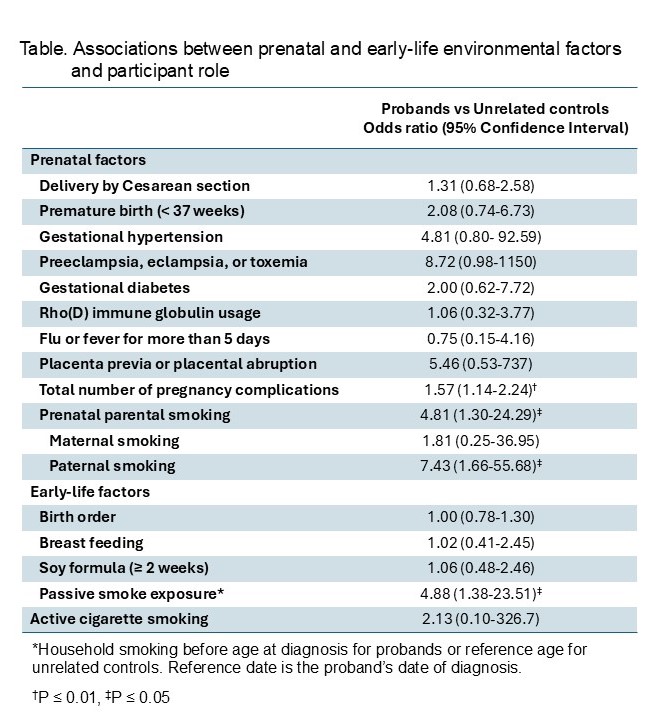Session Information
Session Type: Poster Session A
Session Time: 10:30AM-12:30PM
Background/Purpose: Systemic autoimmune rheumatic diseases (SARDs), including juvenile idiopathic arthritis (JIA), systemic lupus erythematosus (SLE), idiopathic inflammatory myopathies (IIM), and systemic sclerosis (SSc), are characterized by immune dysregulation. While genetic predisposition contributes to disease susceptibility, environmental exposures, including those during the prenatal period and early childhood, may potentially influence disease risk. Evidence regarding these early-life factors is limited and inconsistent. This study aimed to examine associations between early-life environmental exposures and juvenile-onset SARDs.
Methods: A case-control study included 124 probands with juvenile-onset SARDs diagnosed within 5 years (99 with juvenile IIM, 16 with JIA, 5 with SSc, and 4 with SLE), their same gender, close-in-age unaffected siblings (n=121), and demographically matched unrelated controls without autoimmune disease (n=90). The proband’s date of diagnosis served as the reference date for their siblings and matched controls. Participants resided in the United States or Canada. Parents of pediatric patients completed questionnaires on pregnancy complications, parental smoking during pregnancy, early-life exposures, and active smoking history. Paired analyses between probands and their siblings were performed using conditional logistic regression models adjusted for age. Probands and controls were compared by logistic regression analysis, adjusting for potential confounding variables including age, sex, race, ethnicity, and education level.
Results: The median age at reference date was 7.4 years for probands, 8.4 years for siblings, and 9.2 years for controls. Sex and race distributions did not differ significantly among groups: 62% of probands and siblings were female compared to 66% of controls; 85% of probands and siblings were White compared to 87% of controls. No significant differences in pregnancy complications or early-life exposures were observed between probands and their siblings. However, compared to controls, juvenile-onset SARDs were associated with multiple pregnancy complications (OR 1.57, CI:1.14–2.24), but not with any specific complication (Table). Prenatal parental smoking was also significantly associated with juvenile-onset SARDs (OR 4.81, CI:1.30–24.29). While maternal smoking rates were similar between groups, paternal smoking was more frequent in probands compared to controls (OR 7.43, CI:1.66–55.68). Early-life exposures, such as birth order, breastfeeding and soy formula use, did not differ significantly between probands and controls. Passive smoke exposure before reference age was also associated with juvenile-onset SARDs (OR 4.88, CI:1.38–23.51). Active smoking was uncommon, with one proband and two siblings reporting tobacco use.
Conclusion: The number of pregnancy complications was associated with juvenile-onset SARDs, without an association with a specific complication. Parental smoke exposure during prenatal and early-life periods was strongly associated with SARDs. These findings highlight the importance of pregnancy and early-life factors in these diseases.
 Table. Associations between prenatal and early-life environmental factors and participant role
Table. Associations between prenatal and early-life environmental factors and participant role
To cite this abstract in AMA style:
Ohnishi T, Zhao M, Shi M, Schiffenbauer A, Jackson S, Jansen A, Bayat N, Farhadi P, Parks C, Weinberg C, Miller F, Rider L. Prenatal and Early-Life Environmental Exposures in Juvenile-Onset Systemic Autoimmune Rheumatic Diseases [abstract]. Arthritis Rheumatol. 2025; 77 (suppl 9). https://acrabstracts.org/abstract/prenatal-and-early-life-environmental-exposures-in-juvenile-onset-systemic-autoimmune-rheumatic-diseases/. Accessed .« Back to ACR Convergence 2025
ACR Meeting Abstracts - https://acrabstracts.org/abstract/prenatal-and-early-life-environmental-exposures-in-juvenile-onset-systemic-autoimmune-rheumatic-diseases/
